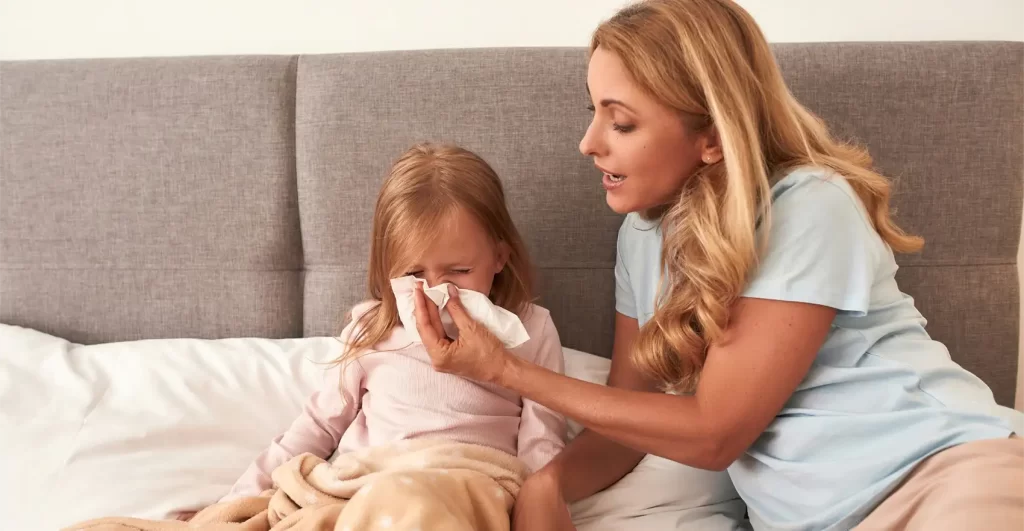Allergy
Northern Sydney Allergy
Dr Monica Falk
Specialist care for children, families, and adults living with allergies
Expert allergy care for all ages — from babies to seniors.
Led by Dr Monica Falk, we offer friendly, personalised testing and treatment for food allergies, hay fever, and more.
Food Allergies

Food allergies are increasingly common, especially in children. At Northern Sydney Allergy, we help identify and manage food allergies with safe, evidence-based testing and personalised care. Whether it’s a reaction to peanuts, eggs, milk, seafood or other foods, we’ll work with you to confirm the diagnosis and create a clear management plan — including options like food challenges, dietary advice, and desensitisation where appropriate.
Peanut Allergies Affecting Babies
Peanut allergies create problems for people of all ages. However, a new program is available to help infants under the age of 12 months become tolerant of peanut. If you think this applies to you, you should call for an appointment so we can consider referring you to a treatment centre of one of the paediatric allergy departments within several public hospitals in Sydney.
Skin Prick Testing for Food Allergies
Skin prick testing is a quick and reliable way to help identify food allergies. A tiny drop of the suspected allergen is placed on the skin (usually the forearm), and a gentle prick allows it to enter the surface. If a small, raised bump appears, it suggests a possible allergy. This test is safe and well-tolerated — even for young children — and results are available within 15–20 minutes.
However, sometimes skin prick results are unclear or don’t match your child’s history. In these cases, we may recommend a food challenge, which is the gold standard for diagnosing food allergies.
Together, these tests help ensure a clear and confident diagnosis — and reduce unnecessary food restrictions.
Food Challenges
Oral food challenges are the most accurate way to confirm or rule out a food allergy in situations where there is uncertainty. These tests are conducted in our clinic under close medical supervision, and involve gradually introducing small amounts of a suspected food in a safe, controlled setting. They are especially useful when previous test results are unclear or when assessing whether a child has outgrown an allergy.
Our team ensures a calm, supportive environment to make the process as safe and stress-free as possible.
Food challeges are time consuming; patients spend about 4 hours in the clinic under constant supervision. A lot of allergy clinics don’t offer food challenges because of this, but it is an important part of the diagnostic procedure.
Severe Allergic Reactions
After a thorough assessment, and there is a history of a severe allergic reaction or a food challenge has demonstrated an allergic response, it is posisble for the person to experience a severe allergic reaction if exposed to the food that causes the reaction. This can include simple foods like eggs or milk, foods in common use. It is important for a patient to understand not only the risks, but also to be aware of the emergency treatments that need to be commenced as soon as a severe allergic reaction is detected.
Early treatment can minimise the harm that might arise, while ignoring the reaction can lead to death. It is important for patients and their families to be fully aware of what action to take and to know how to use the prescribed medication as instructed.
Only an allergy specialist can provide the initial prescription for these medications.
Action Plans
An allergy action plan is a personalised, written guide that outlines how to recognise and respond to an allergic reaction. These plans are essential for children with food allergies — especially in school or childcare settings. They include step-by-step instructions on what symptoms to look for, which medications to use (such as antihistamines or adrenaline auto-injectors), and when to seek emergency help.
At Northern Sydney Allergy, we provide customised action plans to ensure parents, carers, teachers, and patients feel confident and prepared.
Inappropriate Food Restrictions
We often see children who have been placed on restrictive diets based on either uncertain allergy test results, a poor professional understanding of food allergy, or past reactions that they may have outgrown.
Unnecessary food avoidance can lead to nutritional deficiencies, increased anxiety, and a lower quality of life — especially for growing children.
At Northern Sydney Allergy, we use accurate testing, including oral food challenges when needed, to determine which foods truly need to be avoided. Our goal is to minimise restrictions while keeping your child safe, healthy, and confident around food.
Hayfever or Allergic Rhinitis

Hay fever affects thousands of children and adults each year, causing sneezing, itchy eyes, a blocked or runny nose, and fatigue — especially during spring and summer.
At Northern Sydney Allergy, we help identify the triggers through allergy testing and provide a personalised treatment plan.
Options may include antihistamines, nasal sprays, or allergen immunotherapy for long-term relief. With the right care, you or your child can enjoy life without the constant struggle of allergy symptoms.
Social Problems for Children Experiencing Hayfever
For many children, hay fever is more than just sneezing and itchy eyes — it can interfere with sleep, concentration, and confidence.
Constant symptoms can make it hard to focus at school, participate in sport, or enjoy outdoor play with friends. Children may feel embarrassed by their symptoms or frustrated by always feeling unwell.
We work with families to create effective treatment plans that help children feel better, stay active, and fully engage in daily life.
Treatment Options for Allergic Rhinitis
Allergic rhinitis includes a number of treatment options and the type an individual uses will depend on the severity of their symptoms and how much they interfere with day-to-day life.
Treatment can be symptomatic and works by reducing inflammation in the affected areas. This could include antihistamines, nasal corticosteroids, or eye drops and they tend to be used during ‘hayfever season’. However, the body can also be trained to become less allergic to the agents a person is allergic to. The selection of agents is determined by the results of skin prick testing and are custom made for each patient. The treatment can take about 3 years, but it provides long term relief. This is particularly useful for people whose symptoms are particularly difficult.
Other Allergic Problems We Treat
In addition to food allergies and hay fever, we manage a wide range of allergic conditions affecting both children and adults, including:
- Hives: While not related to allery, hives are an immunological conditions we treat regularly.
- Eczema (Atopic Dermatitis): Itchy, inflamed skin often linked to allergies in babies and children.
- Eye Allergies: Cause red, itchy, watery, and swollen eyes — often triggered by pollen, dust mites, pets, or mould.
- Asthma: Often triggered by allergens like dust, pollen, or pet dander.
- Insect Sting Allergies: Reactions to bees, wasps or ants — sometimes severe and requiring an EpiPen.
- Drug Allergies: Allergic reactions to medications such as antibiotics or pain relievers.
- Latex Allergy: Sensitivity to products made with natural rubber latex.
- Contact Allergies: Skin reactions to substances like soaps and fragrances.
Our team provides thorough assessment and practical, personalised care plans to help manage and reduce allergic symptoms — whatever the trigger.
AMA House,
Suite 103, 69 Christie Street
St Leonards
Why the Scientific Method Matters in Allergy Care
We rely on the scientific method to ensure that every diagnosis and treatment is based on evidence to create an accurate diagnosis and focus on patient safety.
Allergies can be complex, and relying on guesswork, unvalidated testing, or anecdotal advice can lead to unnecessary worry, restrictive diets, or missed diagnoses. By using proven tools — like skin prick testing, blood tests, and oral food challenges — we follow a clear process: observe symptoms, test hypotheses, and confirm findings through controlled, repeatable methods.
This scientific approach ensures that treatment plans are not only safe but also individualised and effective. Whether we’re confirming a food allergy, determining suitability for immunotherapy, or managing seasonal hay fever, each decision is guided by peer-reviewed research and clinical best practice. This means fewer unnecessary restrictions, better symptom control, and peace of mind for families who want to understand and manage their allergies with confidence.
A Note on Non-Scientific Allergy Testing
Some practitioners may use alternative testing methods such as hair analysis, electrodermal testing, or IgG blood panels to diagnose allergies or food intolerances. While these approaches are often well-intentioned, they are not supported by scientific evidence and can lead to inaccurate diagnoses. Families are sometimes told to avoid multiple foods unnecessarily, which can impact nutrition, increase anxiety, and reduce the quality of life — especially in children.
Myths and Facts
Myth: "Hair analysis can detect food allergies."
Fact:
Hair analysis has no scientific basis for diagnosing allergies. It is not recognised by allergy specialists or medical authorities.
Myth: "IgG blood tests show what foods you're allergic to."
Fact:
IgG tests measure food exposure, not allergy or intolerance. High IgG levels often reflect what you’ve eaten recently — not what you’re allergic to.
Myth: "You should avoid any food that shows a reaction on any test."
Fact:
A positive result on its own does not confirm an allergy. Diagnosis must include clinical history and, if needed, supervised oral food challenges.
Myth: "Alternative allergy tests are safer than medical testing."
Fact:
Medically supervised tests like skin prick and food challenges are proven to be safe and accurate, especially when conducted by experienced professionals.
On the other hand, alternative tests are not proven with adequate peer reviewed data.
Myth: "If a test says you're allergic, you should cut out that food immediately."
Fact:
Unnecessary food restrictions can harm nutrition and wellbeing. Only avoid foods when a true allergy is confirmed by reliable testing.
At Northern Sydney Allergy, we understand the confusion this can cause. That’s why we focus on evidence-based allergy care, helping families make informed decisions using methods that are medically proven to be safe, accurate, and effective.
Telehealth Appointments
At Northern Sydney Allergy, we understand that distance can be a barrier to accessing specialist allergy care. That’s why we offer telehealth consultations for patients living in regional and remote areas, helping them avoid long travel times and the cost of overnight accommodation in Sydney.
While in-person appointments are generally required for new patients — especially when a physical examination or skin prick testing is needed — we can often use blood tests to investigate specific allergy concerns in regional cases. These can be arranged locally and discussed via video consultation. Although blood tests take longer to return results, are more costly, and receive less Medicare support than skin testing, they can still provide helpful guidance when face-to-face visits aren’t practical.
We remain committed to delivering expert, evidence-based allergy care — whether you’re in the clinic or connecting from afar.
Why Choose Dr Falk?
At Northern Sydney Allergy, your care is led by Dr Monica Falk, a specialist with advanced training in paediatric allergy and a strong focus on evidence-based medicine.
Dr Falk is committed to staying at the forefront of allergy care through ongoing professional development, including participation in leading medical conferences and engagement with current allergy research. This ensures that every diagnosis and treatment plan is based on the latest science — not outdated guidelines or unproven methods.
What sets our clinic apart is our dedication to patient-centred care. We take the time to listen, assess, and understand each patient’s unique symptoms and circumstances — whether it is a baby, a child, teenager, or an adult.
Our goal is to deliver personalised assessments, treatments, and outcomes that not only manage symptoms, but improve quality of life. At Northern Sydney Allergy, you’re not just receiving care — you’re receiving care that’s informed, individualised, and focused on what matters most: your health and wellbeing.